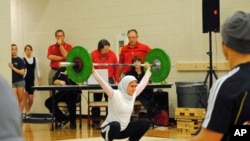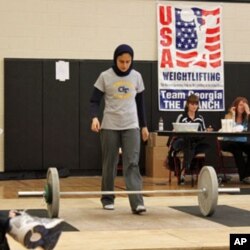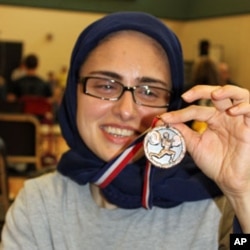When Kulsoom Abdullah started weightlifting three years ago, she never thought she would be the first headscarf-donning Muslim American to compete in the USA National Weightlifting Championships - America’s most prestigious weightlifting competition.
What fueled Abdullah’s doubts and set her apart from fellow competitors was her dress code. As a devout Muslim, she chose to wear modest clothing - long-sleeved T-shirts and loose pants – garb that didn’t conform with official competition rules.
But the Atlanta, Georgia, native was given her chance in late June when the International Weightlifting Federation (IWF), in response to a challenge by Abdullah, modified its competing rules to allow tight-fitting, body-length unitards for the first time.
Watch the interview with Kulsoom Abdullah:
Game changer
Now, weightlifters who participate in competitions organized by any IWF member organizations worldwide – not just in the U.S. – can choose to participate in uniforms that cover their arms and legs.
As a result, Abdullah, on top of being probably the only PhD in electrical and computer engineering who can “deadlift” 111 kilos, today qualifies for national championships while wearing a headscarf and long sleeves.
The IWF’s decision is a bold move considering its former rules stipulated that “costumes” had to be collarless and couldn’t cover elbows or knees; the rules even specified how high socks could go and how much skin bandages could cover.
Follow-up report from the competition by Tala Hadavi:
Against other odds
The rule change did not come in a vacuum. A few weeks before the IWF’s decision passed, the International Federation of Association Football (FIFA) banned the Iranian women’s soccer team from competing in a pre-Olympic game against Jordan, and the Quebec Soccer Foundation fired a Canadian female teen referee. Both governing bodies pointed to headscarfs and untraditional clothing as violating competition rules.
“Those are preposterous outcomes … A woman should be able to participate in sport and abide by her faith; those two things are not mutually exclusive,” said Gadeir Abbas, the staff attorney with the Council on American Islamic Relations (CAIR) who had been working on the case of the Canadian referee. At the same time, he praised the IWF for taking the lead on this issue saying its decision reflects well on its leadership.
Rules as “works in progress”
John Duff, chief executive officer of USA Weightlifting, said modifying the competition rules for inclusivity was already on the IWF’s agenda. But he also stressed that rules are never set in place to discriminate.
“The [original] rules were not discriminatory in any shape or form. The rules are the rules, and every federation that is a member organization of the international federation complies and follows those rules,” he said. “They aren’t set for a particular country or a particular nationality or people or place…Every country and everybody who participates in the sport follows it.”
IWF officials have repeatedly emphasized that the headscarf by itself was never a concern. But, as Duff pointed out, rules are generally there to prevent athletes from gaining an unfair advantage by using extra material to hide a support mechanism on a joint, for instance. He explained that long clothing could make it difficult for judges to determine whether an athlete’s elbows or knees are locked.
An appeal from Abdullah and CAIR prompted an IWF technical committee to debate the dress code rules in Malaysia during the last week of June, ahead of July championships. The debate ended up paving the way toward a change in the rules.
Abdullah as trailblazer
While conceding that some clothing could be used to mask certain body parts and manipulate performance, Abdullah ended up putting together a 43-slide presentation to demonstrate to the IWF how, in her case, judges can see her joints even through a long-sleeved, tight-fitting unitard or looser singlet.
CAIR’s Abbas said that Abdullah essentially won this fight on her own.
“Kulsoom was her own best advocate, she’s an iconoclast: a PhD in electric engineering that can deadlift 150 pounds over her head…. She was a uniquely capable person to push for change,” said he.
Abdullah’s case was the “textbook example of how it should work,” said Abbas, adding that if the IWF had rejected her appeal, it would have amounted to discrimination.
“When… an organization is adhering to [an] old rule to exclude someone new that wants to participate, the failure to adjust is indicative of a discriminatory mindset,” he said.
Abdullah, who now looks forward to competing in the National Weightlifting Championships later this month, says unfortunately many Muslim women get caught in a vicious cycle of stereotypes.
“It’s a shame because the Muslim world is being criticized – they say you’re oppressing women or not empowering them… and then when a woman chooses to cover and participate, it’s also seen as a problem.”
Abdullah says she hopes her case will be an example for other female athletes who choose to dress modestly while competing in any sport, regardless of their faith. As for people adverse to change – she calls on them to try to keep their minds open about it.






